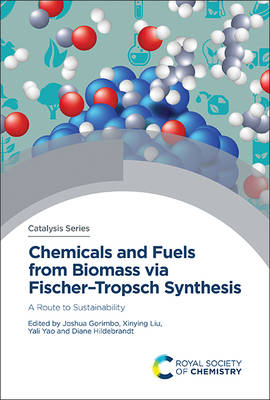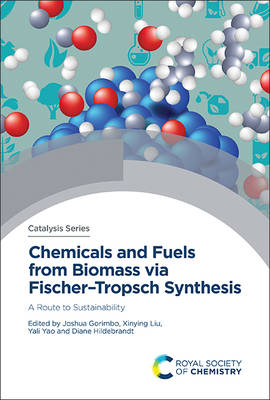
- Afhalen na 1 uur in een winkel met voorraad
- Gratis thuislevering in België vanaf € 30
- Ruim aanbod met 7 miljoen producten
- Afhalen na 1 uur in een winkel met voorraad
- Gratis thuislevering in België vanaf € 30
- Ruim aanbod met 7 miljoen producten
Chemicals and Fuels from Biomass Via Fischer-Tropsch Synthesis
A Route to Sustainability
Omschrijving
In an effort to reduce dependency on fossil fuel resources, biomass could essentially be converted into chemicals using high capacity processes. The Fischer-Tropsch Synthesis (FTS) pathway has been chosen as the focus of this book as it is a mature area, and unlike other pathways such as pyrolysis, FTS is a potential way of producing fuel/hydrocarbons with no sulfur, no nitrogen, and no heavy metals contamination, making it a good choice. Integrating technological development and business development rationales to highlight the key technological developments that are necessary to industrialize biofuels on a global scale, this book focusses on the key challenges that still hinder the effective biomass use and the realization of zero fossil fuel use. Traditional biomass to hydrocarbons pathways are covered, showcasing how they are tailored to yield a specific group of chemicals with the aim of reducing downstream processes. New developments are considered, including process synthesis, catalysts, and reactors, etc.
Providing an up-to-date overview of the production of specialty chemicals and fuels from biomass via the Fischer-Tropsch Synthesis pathway, this title makes an excellent addition to the libraries of academics and practitioners working in catalysis and chemical engineering.
Specificaties
Betrokkenen
- Uitgeverij:
Inhoud
- Aantal bladzijden:
- 498
- Taal:
- Engels
- Reeks:
- Reeksnummer:
- nr. 44
Eigenschappen
- Productcode (EAN):
- 9781839163937
- Verschijningsdatum:
- 18/11/2022
- Uitvoering:
- Hardcover
- Formaat:
- Ongenaaid / garenloos gebonden
- Afmetingen:
- 157 mm x 236 mm
- Gewicht:
- 907 g

Alleen bij Standaard Boekhandel
Beoordelingen
We publiceren alleen reviews die voldoen aan de voorwaarden voor reviews. Bekijk onze voorwaarden voor reviews.










